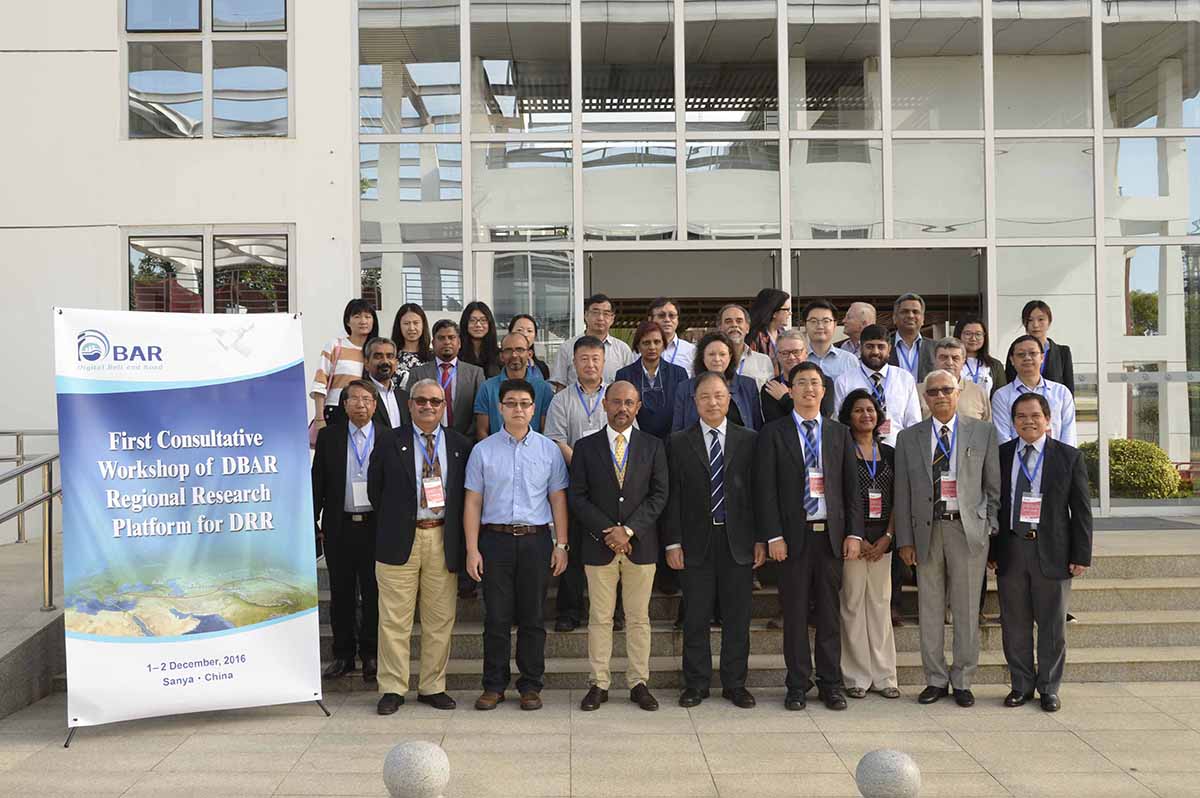DBAR Launches Working Group for Disaster Risk Reduction
The First Consultative Workshop of the DBAR Regional Research Platform for Disaster Risk Reduction was held in Sanya, China, on December 1 and 2, 2016. The event was co-organized by the Digital Belt and Road (DBAR) Program, CAS-TWAS Centre of Excellence on Space Technology for Disaster Mitigation (SDIM), Integrated Research on Disaster Risk (IRDR) International Programme Office (IPO), IRDR China National Committee (IRDR CHINA), Chinese Academy of Sciences (CAS) Institute of Remote Sensing and Digital Earth (RADI), and International Society for Digital Earth (ISDE). More than 50 participants from 18 countries, including India, Nepal, Malaysia, Indonesia, Pakistan, South Africa, Sri Lanka, Bangladesh, Britain and France, attended the workshop.
The workshop aimed to push forward disaster risk reduction under the framework of DBAR, create a lasting, win-win working mechanism for international sci-tech cooperation on disaster reduction along the Silk Road Economic Belt and the 21st-Century Maritime Silk Road (abbreviated "Belt and Road"). The workshop was meant to study priorities in disaster reduction cooperation and ways to train young talent in relevant countries, and to promote the scientific implementation of the United Nations' Sendai Framework for Disaster Risk Reduction 2015-2030 along the Belt and Road.
The DBAR Disaster Risk Reduction Working Group (DBAR-DISASTER) was officially set up at the opening ceremony held on the morning of December 1. Prof. GUO Huadong, Chair of DBAR's Science Committee, delivered a speech and issued a certificate to the Co-Chairs of DBAR-DISASTER. He pointed out that establishment of the international working group for disaster risk reduction for DBAR will effectively gather scientists, decision makers and practitioners for space-based disaster reduction in the Belt and Road region to join DBAR, promote connections between science and governmental decision making, facilitate the creation of research strategies on disaster risk reduction for the Belt and Road, improve the capability to innovate in the field of disaster science, implement focused research, and help cultivate the disaster reduction capabilities of young experts and research and development personnel.
The Co-Chairs of DBAR-DISASTER are Prof. CHEN Fang, Executive Deputy Director of SDIM and Dr. Rajib Shaw, Executive Director of the IRDR IPO. A total of 17 experts from 13 countries serve as its members, including Prof. Joy Jacqueline Pereira, Academician of the Academy of Sciences Malaysia, Prof. U Aung Myint, Chairman of the Myanmar Engineering Society, Prof. Vinod Kumar Sharma with the India Institute of Public Affairs, Prof. Sugeng Triutomo, Vice Chairman of the Indonesia Disaster Management and Defense Organization, Prof. Wim Hugo, Chief Scientist with the South Africa Environment Observation Network, Prof. Virginia Murray, Vice Chairman of the Science and Technical Advisory Group of the United Nations Office for Disaster Risk Reduction, Prof. WANG Xiaoqing with the Earthquake Prediction Institute of the China Earthquake Administration, and Prof. JIA Gensuo with the CAS Institute of Atmospheric Physics.
The working group discussed and decided on the working mechanism and annual plan of major activities, set priorities for scientific cooperation for disaster risk reduction along the Belt and Road, and had in-depth discussions on such issues as the characteristic demands, new concepts and practical technologies for disaster risk reduction in the Belt and Road region, as well as comprehensive strategies for disaster risk reduction.
The workshop aimed to push forward disaster risk reduction under the framework of DBAR, create a lasting, win-win working mechanism for international sci-tech cooperation on disaster reduction along the Silk Road Economic Belt and the 21st-Century Maritime Silk Road (abbreviated "Belt and Road"). The workshop was meant to study priorities in disaster reduction cooperation and ways to train young talent in relevant countries, and to promote the scientific implementation of the United Nations' Sendai Framework for Disaster Risk Reduction 2015-2030 along the Belt and Road.
The DBAR Disaster Risk Reduction Working Group (DBAR-DISASTER) was officially set up at the opening ceremony held on the morning of December 1. Prof. GUO Huadong, Chair of DBAR's Science Committee, delivered a speech and issued a certificate to the Co-Chairs of DBAR-DISASTER. He pointed out that establishment of the international working group for disaster risk reduction for DBAR will effectively gather scientists, decision makers and practitioners for space-based disaster reduction in the Belt and Road region to join DBAR, promote connections between science and governmental decision making, facilitate the creation of research strategies on disaster risk reduction for the Belt and Road, improve the capability to innovate in the field of disaster science, implement focused research, and help cultivate the disaster reduction capabilities of young experts and research and development personnel.
The Co-Chairs of DBAR-DISASTER are Prof. CHEN Fang, Executive Deputy Director of SDIM and Dr. Rajib Shaw, Executive Director of the IRDR IPO. A total of 17 experts from 13 countries serve as its members, including Prof. Joy Jacqueline Pereira, Academician of the Academy of Sciences Malaysia, Prof. U Aung Myint, Chairman of the Myanmar Engineering Society, Prof. Vinod Kumar Sharma with the India Institute of Public Affairs, Prof. Sugeng Triutomo, Vice Chairman of the Indonesia Disaster Management and Defense Organization, Prof. Wim Hugo, Chief Scientist with the South Africa Environment Observation Network, Prof. Virginia Murray, Vice Chairman of the Science and Technical Advisory Group of the United Nations Office for Disaster Risk Reduction, Prof. WANG Xiaoqing with the Earthquake Prediction Institute of the China Earthquake Administration, and Prof. JIA Gensuo with the CAS Institute of Atmospheric Physics.
The working group discussed and decided on the working mechanism and annual plan of major activities, set priorities for scientific cooperation for disaster risk reduction along the Belt and Road, and had in-depth discussions on such issues as the characteristic demands, new concepts and practical technologies for disaster risk reduction in the Belt and Road region, as well as comprehensive strategies for disaster risk reduction.

Group photo of the attendees.